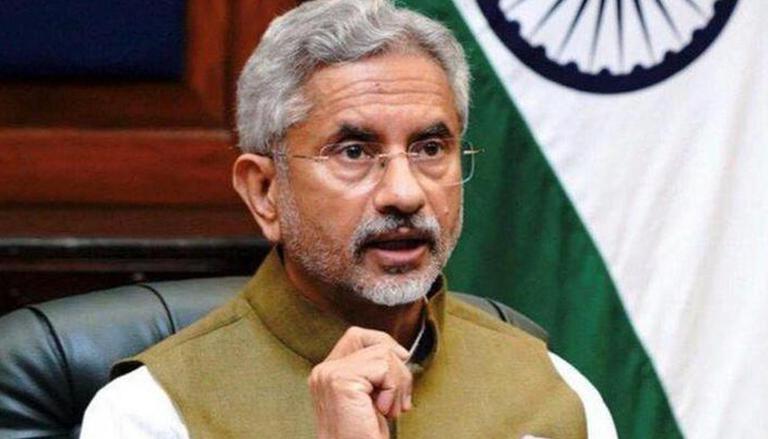EAM S Jaishankar Clarifies 4-member QUAD Not ‘Asian-NATO’; ‘don’t Slip Into Lazy Analogy’
External Affairs Minister Dr S Jaishankar’s presence at the Munich Security Conference (MSC) 2022 is being noted as one that snubs various speculations over India’s demeanour in the international sphere. On Saturday, EAM Jaishankar clarified the four-member dialogue QU is not an ‘Asian NATO’ and exuded confidence in the country’s growing ties with ASEAN in the subcontinent. Pertinently, he also asserted that the state of the India-China border will ‘define the state of relationship’ between both nations and that Beijing and New Delhi are going through a ‘difficult phase’.
EAM Jaishankar states the rationale of QU
Speaking at the panel discussion on ‘A Sea Change? Regional Order and Security in the Indo-Pacific’ at the MSC 2022, EAM Jaishankar dismissed the notion that QU is an ‘Asian NATO’ and termed it as an instigation on part of ‘interested parties’. According to the External Affairs Minister, such analogies (Asian NATO) is a contributory factor to the divisive approach and one should not slip into ‘completely misleading term’.
Underlining that the four-nation strategic dialogue is a kind of 21st Century way of responding to a more ‘diversified and dispersed’ world, EAM Jaishankar said, “QU is a grouping of four countries who have common interests, common values, a great deal of comfort, who happen to be located at four corners of the Indo-Pacific, who found out that in this world no country, not even the US, has the ability to address global challenges all on their own.”
“I would urge you not to slip into that lazy analogy of an Asian-NATO. It isn’t because there are three countries that are treaty allies. We are not a treaty ally. It doesn’t have a treaty, a structure, a secretariat,” he said.
‘QU member states believe the world would be a better place if they cooperated’
QU (Quadrilateral Security Dialogue) is a strategic security dialogue between India, the US, Japan and Australia. Referring to the tension along the Line of Actual Control in eastern Ladakh with China and clarifying whether QU is consequent to the clash, EAM Jaishankar said, “Our relations with the QU partners have steadily improved in the last 20 years. The QU has value in itself. It is four countries who recognise today that the world would be a better place if they cooperated. And that’s essentially what’s happening,” the minister said.
EAM Jaishankar talks about QU’s take on COVID-19
Enumerating the objectives of the said allegiance QU, he said that four member states have agreed to do a vaccine project. “The QU has agreed to do a vaccine project. I don’t think the quad necessarily has an identical view on all subjects, including on the TRIPS waiver. I think we have a range of views on that. Perhaps ours are, in my view, the most progressive.
“The point which is troubling is… if you have a once-in-a-century pandemic with such horrific consequences and then say it has to be business as usual when it comes to producing vaccines, ask yourself- are we doing the right thing?” Jaishankar said.
EAM Jaishankar’s statement holds relevance against October 2020’s India and South Africa’s submission of the first proposal, suggesting a waiver of all WTO members on the implementation of provisions of the TRIPs Agreement in relation to the prevention, contain, and treatment of COVID-19. While stating that large parts of the world would remain un-vaccinated in the absence of ‘effective policies’, he said the same is apparent in the climate change issue as well.
EAM Jaishankar speaks on connectivity principles
Further elaborating the country’s take on connectivity within QU member states, he said, “We would certainly encourage countries whose connectivity principles and policies are similar and I have spent some time discussing with the German development minister how we can work our development policy much closer. It is a conversation we have had with the Japanese, Americans, Australians within Quad but a lot of them are bilateral as well and I think this is going to be among the big issues in intl relations in the coming decades.”
‘India will come out of COVID-19 pandemic more competitive’
Stating that the country is working towards enhancing free trade arrangements and reforms, he said, “We expect a 9.2-9.3 growth rate this year which I think is more than decent. Secondly, our exports are at a record high. So, it shows that despite not being a member of free trade arrangements, the reforms we have done, the belt-tightening we have done, and the learnings of the COVID period have actually created a fairly resilient economy,” he said.
EAM Jaishankar speaks on India’s relations with South-East Asian Countries
Interestingly, the panellist at MSC 2022 mentioned to Dr Jaishankar a poll that reflects a ‘low level of trust between countries in the South-East Asian region and India’. In fact, only 16.6% of voters in the poll have maintained their confidence in India, which was indicated as fairly low.
To which, the EAM replied, “I am a politician, I believe in polls but I have never seen a poll which has made any sense to me when it comes to foreign policy.”
“Our relations with ASEAN are growing well. There are two big changes which are taking place. We have much stronger security cooperation with ASEAN. We have strong bilateral relations with Singapore, Indonesia, and Vietnam amongst others,” he said while adding that the country has much stronger physical connectivity and security cooperation with the ASEA. The country has signed agreements for military supplies to the Philippines and has strong bilateral relations with Singapore, Indonesia and Vietnam, amongst others.
EAM Jaishankar talks about G20 chairmanship in 2023
The Foreign Minister refrained from commenting on the topic and said, “by being a very strong contributing member to the G20, India’s priority is to make sure that the Indonesian chair of the G20 this year is completely successful.”
Image: PTI











